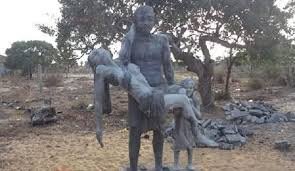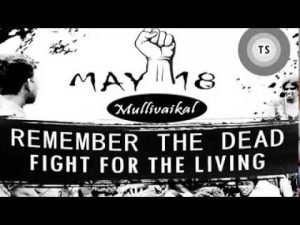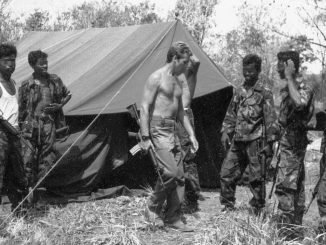
This year marks the tenth anniversary of genocidal slaughter that took place in Sri Lanka in 2009. The final phase of the war ended on May 18th with the merciless slaughter of a huge number of people who were boxed inside a short lagoon called Mullivaikal. Every year the Tamil speaking population around the world remember the dead on this day.
But this day is more than just a remembrance day. Tamil Solidarity argues that this day should also be a political day. This day is celebrated by the Sri Lankan government and Chauvinist forces in Sri Lanka as a victory day. GOSL uses the mullivaikal event to showcase to the world as to how it has ended terrorism. While this day also marks the mass anti-war movement of Tamils that took place across the world, for the first time in history, tens of thousands took to the streets in protest. Parliament and the whole area in London, for example, were surrounded day and night by Tamil protesters. It was the first time in the history of Britain that parliament was surrounded and shut down by an ethnic minority group, who had mobilized in large numbers in its thousands. This gave birth to a certain strength to all diaspora Tamil organizations.
Mullivaikal is not just a day of defeat but also a day that marks the political movement of Tamils.
Apart from the massacre that took place, the questions now in the mind of most Tamils are how will this fightback continue? What is the next course of action? What are the political strategies of the various diaspora organizations?
It is a day in history that raises the question of what is the best perspective and strategy needed for building the fightback. The place named ‘mullivaikal’ is now a political term. Mullivaikal cannot just be classed as a day of genocide but also the beginning of a clear cut political fightback.
Hence Tamil solidarity appeal to all the diaspora organizations to come forward to mark this day as a day of political mobilization. All the organization should make public what strategy and politics they are trying to advance and the work they are doing towards it. We need to use this day as a day of political education, debate, and discussion about what is the best way forward for Tamils struggle.
The number of people attending Mullivaikal day is diminishing as many have not shown interest in just turning out to light a candle which they can do it at home. They want more. If all key diaspora organizations can come forward to present their politics and strategy in a democratic way, it will give a reason for people to turn up. Diaspora should take the issue of accountability seriously and open up a dialogue with people. People should be made aware of all the functions of the organisations. We must encourage everyone to take a direct part in political discussions. Demobilization must stop. Remobilisation should start. Let the Mullivaikal day be the day of political mobilisation.
Ketheswaran S





